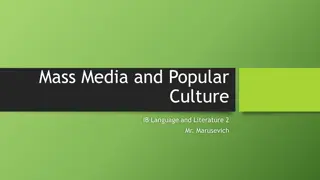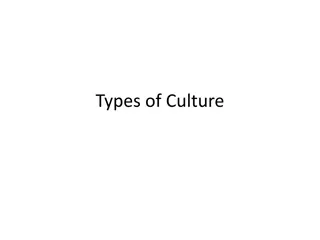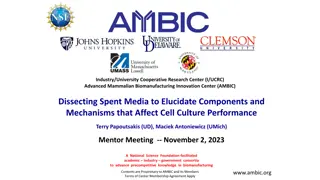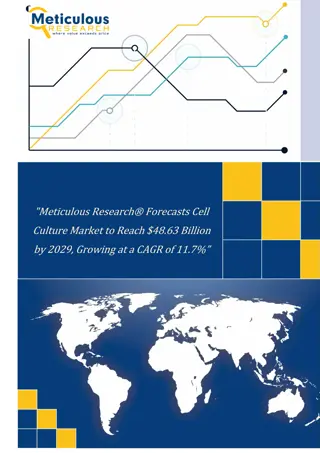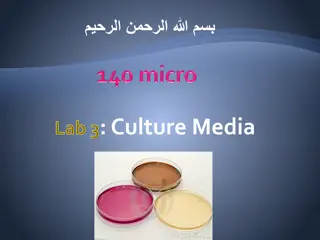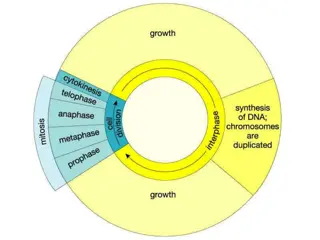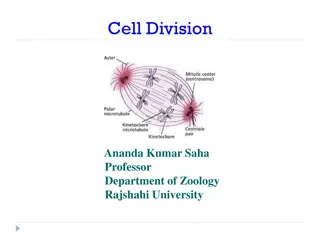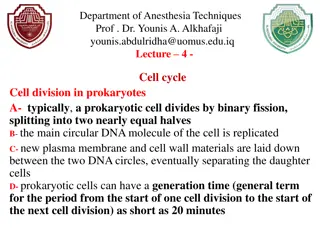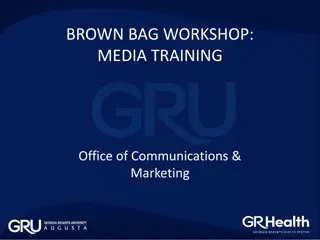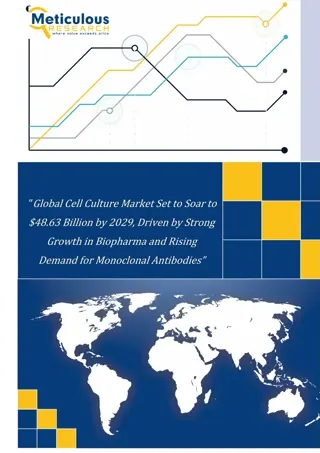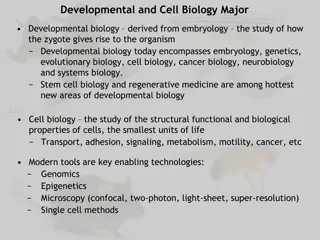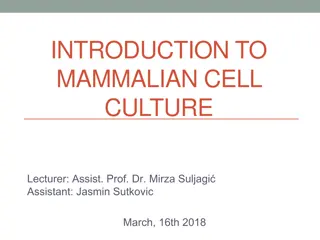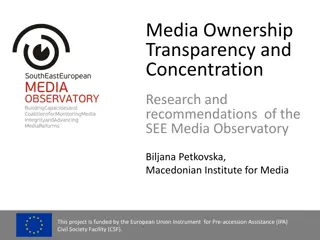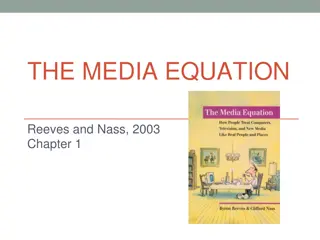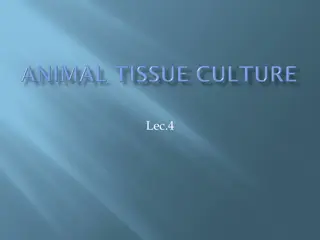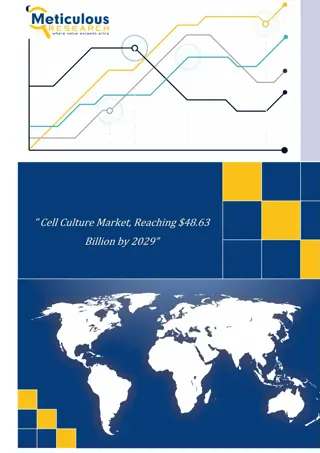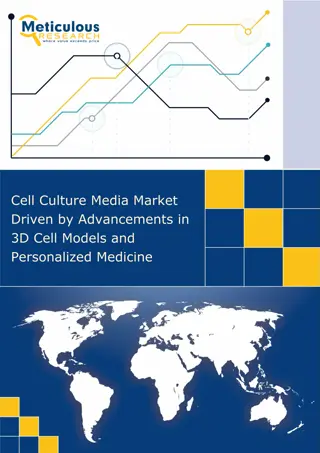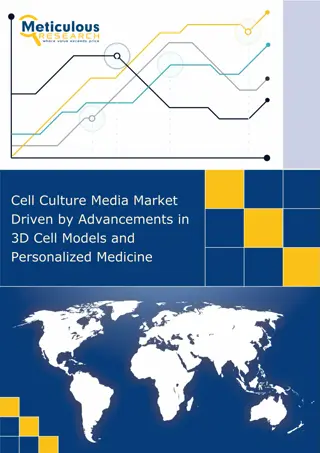Vi-CELL.BLU - Advanced Cell Counting Instrument
Vi-CELL.BLU is a cutting-edge cell counting instrument that offers faster analysis, increased resolution, and improved optical sensor technology for enhanced cell concentration and viability assessments. The device features a user-friendly interface, Trypan blue method for live cell detection, and a
1 views • 19 slides
Understanding Virus-Cell Interactions: Mechanisms and Consequences
Viruses interact with host cells in various ways, encoding genes that manipulate cell functions for their benefit. These interactions can range from benign to lethal outcomes. Factors influencing these interactions include viral factors, cellular responses, and the presence of virulence factors. Dif
0 views • 37 slides
Understanding Mass Media and Communication for the Academic Year 2020/2021
This content delves into the science of media, communication, and mass communication for the academic year 2020/2021. It explores the role of mass media in public communication, the characteristics of mass media, and the various types of mass media such as books, print media, films, radio, televisio
8 views • 11 slides
Understanding Cell Viability Assays in Laboratory Testing
Cell viability assays play a crucial role in determining the health and status of cells, measuring their ability to survive and proliferate. These assays involve various techniques such as dye exclusion, colorimetric, fluorometric, luminometric, and flow cytometric assays. By assessing factors like
6 views • 16 slides
New Media in India: From Fad to Fundamental
Exploring the significance of new media in India, this presentation by Dr. Sunetra Sen Narayan and Dr. Shalini Narayanan delves into the evolution and impact of new media on the global stage. With insightful data and analyses, the session addresses key issues and lessons for India and beyond, drawin
0 views • 34 slides
Culture Media
Culture media play a crucial role in isolating bacteria from clinical specimens. Water, electrolytes, peptone, agar, meat extract, yeast extract, and blood/serum are essential constituents used in culture media. These components provide nutrients, solidifying agents, and growth factors necessary for
1 views • 26 slides
Bacterial Cell Structure and Composition Overview
Bacterial cells exhibit variations in size, typically ranging from 0.75 to 1.5 micrometers. The cell envelope, comprising glycocalyx, cell wall, and cell membrane, plays crucial roles in protection and cell function. The cell membrane, a thin barrier rich in phospholipids and proteins, is integral t
1 views • 28 slides
Understanding Plant Tissue Culture: Methods and Requirements
Plant tissue culture involves the in-vitro culture of plant explants under aseptic conditions, covering cell, organ, and suspension cultures. This process, pioneered by German botanist Gottlieb Haberlandt, relies on the totipotency of plant cells. Key requirements include laboratory organization, su
0 views • 18 slides
Understanding Mass Media and Popular Culture: The Role, Influence, and Sociological Theories
Mass media encompasses various forms of communication that reach a broad audience, influencing culture and shaping perceptions of celebrity. Sociological theories, such as Limited Effects Theory and Culturist Theory, explain how media interacts with society. Popular culture refers to widely consumed
5 views • 9 slides
Understanding Plant Tissue Culture Media and Their Importance in In Vitro Growth
Plant tissue culture media play a crucial role in the in vitro growth and morphogenesis of plant tissues. The composition of culture media depends on the specific plant species and the type of material used for culture. Various types of media, such as White's medium, MS medium, B5 medium, N6 medium,
0 views • 6 slides
Overview of Cell Culture Methods and Importance in Research
Introduction to the principles of cell culture, including tissue culture, organ culture, and cell culture methods. Discusses the advantages and disadvantages of each technique and highlights the need for cell culture in research for studying cellular behavior and large-scale production of cell mater
3 views • 45 slides
Understanding Popular Culture: Classification and Impact
General classification of culture includes Popular, High/Elite, Low/Subculture, Primary & Secondary, Folk, and Co-Culture. Popular culture, shaped by mass media, encompasses ideas, attitudes, and phenomena favored by society. It influences daily life, with examples like styles of dress, slang, and s
0 views • 16 slides
Understanding Media Ecology: Impact of Communication Technology
Media ecology is a theoretical concept analyzing the influence of media and communication technology on human culture. Neil Postman, a prominent figure in the field, delves into how communication media affect human perception, understanding, and values. This study views media as environments shaping
4 views • 23 slides
Overview of Media Studies Disciplines and Historical Development
Media studies is a multidisciplinary field that explores the content, history, and effects of various media, with roots in the relationship between media and culture. Originating in the 1920s, media studies draws on traditions from social sciences and humanities, incorporating theories from discipli
5 views • 18 slides
Advancements in Cell Culture Performance Optimization Through Dissecting Spent Media
The Industry/University Cooperative Research Center (I/UCRC) Advanced Mammalian Biomanufacturing Innovation Center (AMBIC) is focusing on dissecting spent media to understand the components affecting cell culture performance. The project aims to identify growth-promoting and inhibiting factors in sp
0 views • 16 slides
Media Studies Course Overview at Ramsey Grammar School
Learners at Ramsey Grammar School in Year 9 can expect a comprehensive Media Studies course covering various media forms such as advertising, video games, newspapers, magazines, music videos, radio, websites, and social media. The course is assessed through exams and coursework, focusing on explorin
0 views • 9 slides
Regulation of the Cell Cycle: A Comprehensive Overview
Variation in cell cycle length in humans, controlled by internal and external mechanisms, with special proteins and checkpoint systems ensuring proper progression. External events trigger initiation and inhibition of cell division, while internal checkpoints maintain genetic integrity and chromosome
4 views • 14 slides
Meticulous Research® Forecasts Cell Culture Market to Reach $48.63 Billion by 2029, Growing at a CAGR of 11.7%”
Cell Culture Market by Product [Consumables (Media, Reagents, Sera, Cell Lines), Equipment (Bioreactor, Centrifuge, Cell Counter)], Application (Bioproduction, Cancer Research, Stem Cell, Diagnostic), End User (Pharma, academic) - Global Forecast to
0 views • 3 slides
Understanding Culture Media for Microorganisms
Culture media play a vital role in the growth and study of microorganisms. This content covers the primary ingredients required by all living organisms, types of culture media based on physical state, and specific media for bacteria and fungi. It explains the components and purposes of different typ
0 views • 24 slides
Understanding the Cell Cycle and Mitosis Process
The cell cycle consists of two main periods: Interphase and Mitosis. During Interphase, the cell prepares for division by growing in size and copying chromosomes. Mitosis, the division of the nucleus, results in the formation of two daughter cells with identical chromosome copies. Centrioles and cen
0 views • 26 slides
Understanding Cell Division: Processes and Types
Cell division is a vital process in living cells for growth and reproduction. This article explores the basics of cell division, including the cell cycle, types of cell division (such as mitosis and meiosis), and the initiation of cell division. It also covers key phases like interphase and provides
0 views • 20 slides
Overview of Cell Division in Prokaryotes and Eukaryotic Cells
Cell division plays a crucial role in the growth and reproduction of all organisms. In prokaryotic cells, binary fission is the primary mode of division, while eukaryotic cells undergo a more complex process involving cell growth, DNA replication, chromosome distribution, and cytokinesis. The cell c
0 views • 10 slides
Media Relations Workshop Insights
Explore the importance of media training, the evolving media landscape, why working with the media is crucial, the role of media relations, strategies for media exposure, handling reporter interactions, and more. Learn how to navigate the media landscape effectively and enhance your organization's r
0 views • 17 slides
Global Cell Culture Market Set to Soar to $48.63 Billion by 2029, Driven by Strong Growth in Biopharma and Rising Demand for Monoclonal Antibodies
Cell Culture Market by Product [Consumables (Media, Reagents, Sera, Cell Lines), Equipment (Bioreactor, Centrifuge, Cell Counter)], Application (Bioproduction, Cancer Research, Stem Cell, Diagnostic), End User (Pharma, academic) - Global Forecast to
0 views • 5 slides
Explore the World of Developmental and Cell Biology
Developmental biology, stemming from embryology, investigates how organisms evolve from a zygote. It merges various fields like genetics, cell biology, and cancer biology. Cell biology focuses on cell properties and behaviors, using tools like genomics and microscopy. Research areas include cancer c
0 views • 8 slides
Role of Cell Cycle in Nanoparticle Uptake and Dilution in Cell Population
The cell cycle plays a crucial role in the cellular uptake and dilution of nanoparticles within a cell population. This process involves different phases such as G1, S, G2, and M, each with specific functions related to cell growth, DNA synthesis, protein synthesis, and cell division. Understanding
0 views • 20 slides
Media Liaison Strategies in Sekhukhune District Municipality
Sekhukhune District Municipality employs various media liaison strategies such as the Sekhukhune Press Club, Facebook pages, press statements, and quarterly networking sessions to engage with local media effectively. They work closely with media partners including print and electronic media outlets,
0 views • 15 slides
Exploring Cell Structure and Function in Developmental Biology
Discover the intricate world of cell structure and function in the context of developmental biology. Delve into the inner workings of organelles, their functions, and how they contribute to cellular activities. Engage in interactive activities like building cell models and playing Cell Detective to
0 views • 14 slides
An Overview of Cell Culture Techniques
Cell culture is a vital laboratory technique used in various fields of science to grow and maintain cells outside their natural environment. The process involves cell isolation, maintenance in a suitable environment, sub-culturing, and incubation in controlled conditions. Basic equipment like weighi
0 views • 14 slides
Understanding Cell Cycle Control in Biology
Maintaining control of the cell cycle is crucial to producing healthy daughter cells and preventing mutations that can lead to degenerative diseases like Parkinson's or cancer. Cell cycle checkpoints at G1, G2, and Metaphase ensure the cell meets specific requirements before progressing to the next
0 views • 11 slides
Understanding Cell Structure and Function
Explore the intricate world of cell biology through this comprehensive guide covering the definition of a cell, the characteristics of animal cells, the role of the nucleus, ribosomes, cell structure, organelles, cell membrane, and cell wall. Discover the fascinating details of eukaryotic cells and
0 views • 61 slides
Understanding the Functions of Cell Organelles
Explore the vital functions of different cell organelles such as the cell membrane, nucleus, endoplasmic reticulum, lysosomes, Golgi apparatus, mitochondria, cytoplasm, ribosomes, vacuole, cell wall, chloroplasts, and chlorophyll in a cell. Learn how each organelle plays a unique role in maintaining
0 views • 38 slides
Basics of Mammalian Cell Culture
Mammalian cell culture involves the removal of cells from an organism for growth in a controlled environment. Primary cell cultures can be sub-cultured, leading to the generation of cell lines. Sub-culturing involves transferring cells to fresh growth media for further growth. Different methods and
0 views • 29 slides
Enhancing Media Integrity in South East Europe
South East European Media Observatory focuses on media ownership transparency, concentration, and integrity in the region. Through research, reports, and grants, it aims to promote media freedom, pluralism, and ethical journalism. The Observatory identifies risks to media integrity across various ar
0 views • 26 slides
Understanding Human Interaction with Media - The Media Equation by Reeves and Nass
Research from "The Media Equation" by Reeves and Nass explores how humans interact with media, treating it as if it were real life. The hypothesis posits that humans respond to media just as they do to real-world interactions. Examples illustrate how individuals engage with various forms of media, e
0 views • 15 slides
Understanding Algal Culture Media for Lab Growth
Algae in natural habitats acquire essential nutrients from water, but for lab cultivation, specialized growth media are necessary. Various types of algal culture media exist, each with specific nutrient components like nitrogen, phosphorus, vitamins, and trace metals. Common media include marine alg
0 views • 6 slides
Understanding Animal Tissue Culture and Cell Line Production
Animal tissue culture involves growing tissues separate from the animal in a laboratory setting. To achieve exponential cell growth, cells are converted into immortal cell lines. The production of a cell line involves steps like breaking cell adhesion, incubation, and transferring cells to fresh med
0 views • 22 slides
Cell Culture Market, Reaching $48.63 Billion by 2029
Cell Culture Market by Product [Consumables (Media, Reagents, Sera, Cell Lines), Equipment (Bioreactor, Centrifuge, Cell Counter)], Application (Bioproduction, Cancer Research, Stem Cell, Diagnostic), End User (Pharma, academic) - Global Forecast to
0 views • 5 slides
Cell Culture Media Market Set for Rapid Growth with 13.2% CAGR by 2029
Cell Culture Media Market by Product (Serum-free, Chemically Defined, Classical, Xeno-free\/Animal Component Free), Application (Monoclonal Antibody, Diagnostics, Cancer and Stem Cell Research), End User (Pharma & Biotech, Academic)- Global Forecast
1 views • 4 slides
Cell Culture Media Market Driven by Advancements in 3D Cell Models and Personali
The **Cell Culture Media Market** is set to experience remarkable growth over the coming years, with projections indicating a compound annual growth rate (CAGR) of 13.2%. By 2029, the market is expected to reach a value of $14.64 billion
0 views • 4 slides








